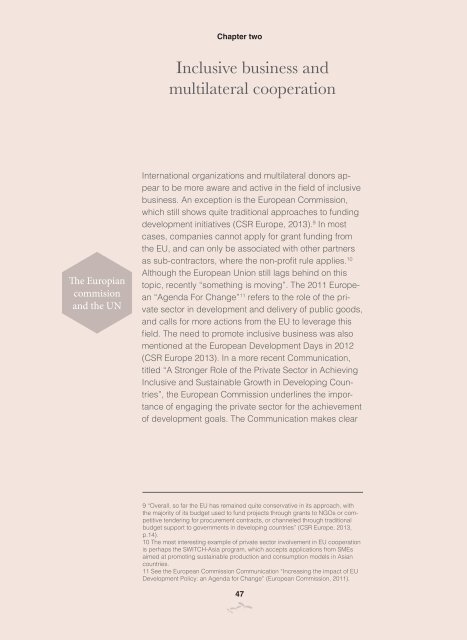INCLUSIVE BUSINESS
Create successful ePaper yourself
Turn your PDF publications into a flip-book with our unique Google optimized e-Paper software.
Chapter two<br />
Inclusive business and<br />
multilateral cooperation<br />
The Europian<br />
commision<br />
and the UN<br />
International organizations and multilateral donors appear<br />
to be more aware and active in the field of inclusive<br />
business. An exception is the European Commission,<br />
which still shows quite traditional approaches to funding<br />
development initiatives (CSR Europe, 2013). 9 In most<br />
cases, companies cannot apply for grant funding from<br />
the EU, and can only be associated with other partners<br />
as sub-contractors, where the non-profit rule applies. 10<br />
Although the European Union still lags behind on this<br />
topic, recently “something is moving”. The 2011 European<br />
“Agenda For Change” 11 refers to the role of the private<br />
sector in development and delivery of public goods,<br />
and calls for more actions from the EU to leverage this<br />
field. The need to promote inclusive business was also<br />
mentioned at the European Development Days in 2012<br />
(CSR Europe 2013). In a more recent Communication,<br />
titled “A Stronger Role of the Private Sector in Achieving<br />
Inclusive and Sustainable Growth in Developing Countries”,<br />
the European Commission underlines the importance<br />
of engaging the private sector for the achievement<br />
of development goals. The Communication makes clear<br />
9 “Overall, so far the EU has remained quite conservative in its approach, with<br />
the majority of its budget used to fund projects through grants to NGOs or competitive<br />
tendering for procurement contracts, or channeled through traditional<br />
budget support to governments in developing countries” (CSR Europe, 2013,<br />
p.14).<br />
10 The most interesting example of private sector involvement in EU cooperation<br />
is perhaps the SWITCH-Asia program, which accepts applications from SMEs<br />
aimed at promoting sustainable production and consumption models in Asian<br />
countries.<br />
11 See the European Commission Communication “Increasing the impact of EU<br />
Development Policy: an Agenda for Change” (European Commission, 2011).<br />
47


